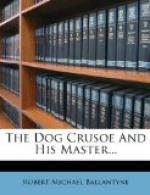We have not been able to ascertain from travellers why the owls have gone to live with these doggies, so we beg humbly to offer our own private opinion to the reader. We assume, then, that owls find it absolutely needful to have holes. Probably prairie-owls cannot dig holes for themselves. Having discovered, however, a race of little creatures that could, they very likely determined to take forcible possession of the holes made by them. Finding, no doubt, that when they did so the doggies were too timid to object, and discovering, moreover, that they were sweet, innocent little creatures, the owls resolved to take them into partnership, and so the thing was settled—that’s how it came about, no doubt of it!
There is a report that rattlesnakes live in these holes also; but we cannot certify our reader of the truth of this. Still it is well to be acquainted with a report that is current among the men of the backwoods. If it be true, we are of opinion that the doggie’s family is the most miscellaneous and remarkable on the face of—or, as Henri said, in the bo’-els of the earth.
Dick and his friends were so deeply absorbed in watching these curious little creatures that they did not observe the rapid spread of the black clouds over the sky. A few heavy drops of rain now warned them to seek shelter, so wheeling round they dashed off at full speed for the clump of willows, which they gained just as the rain began to descend in torrents.
“Now, lads, do it slick. Off packs and saddles,” cried Joe Blunt, jumping from his horse. “I’ll make a hut for ye, right off.”
“A hut, Joe! what sort o’ hut can ye make here?” inquired Dick.
“Ye’ll see, boy, in a minute.”
“Ach! lend me a hand here, Dick; de bockle am tight as de hoss’s own skin. Ah! dere all right.”
“Hallo! what’s this?” exclaimed Dick, as Crusoe advanced with something in his mouth. “I declare, it’s a bird o’ some sort.”
“A prairie-hen,” remarked Joe, as Crusoe laid the bird at Dick’s feet; “capital for supper.”
“Ah! dat chien is superb! goot dog. Come here, I vill clap you.”
But Crusoe refused to be caressed. Meanwhile, Joe and Dick formed a sort of beehive-looking hut by bending down the stems of a tall bush and thrusting their points into the ground. Over this they threw the largest buffalo robe, and placed another on the ground below it, on which they laid their packs of goods. These they further secured against wet by placing several robes over them and a skin of parchment. Then they sat down on this pile to rest, and consider what should be done next.
“’Tis a bad look-out,” said Joe, shaking his head.
“I fear it is,” replied Dick in a melancholy tone.
Henri said nothing, but he sighed deeply on looking up at the sky, which was now of a uniform watery gray, while black clouds drove athwart it. The rain was pouring in torrents, and the wind began to sweep it in broad sheets over the plains, and under their slight covering, so that in a short time they were wet to the skin. The horses stood meekly beside them, with their tails and heads equally pendulous; and Crusoe sat before his master, looking at him with an expression that seemed to say, “Couldn’t you put a stop to this if you were to try?”




